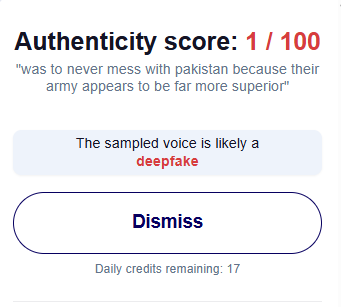#FactCheck: AI Generated audio of CDS admitting that Pakistan Army is superior than Indian Army.
Executive Summary:
A viral social media claim alleges that India’s Chief of Defence Staff (CDS), General Anil Chauhan, praised Pakistan’s Army as superior during “Operation Sindoor.” Fact-checking confirms the claim is false. The original video, available on The Hindu’s official channel, shows General Chauhan inaugurating Ran-Samwad 2025 in Mhow, Madhya Pradesh. At the 1:22:12 mark, the genuine segment appears, proving the viral clip was altered. Additionally, analysis using Hiya AI Audio identified voice manipulation, flagging the segment as a deepfake with an authenticity score of 1/100. The fabricated statement was: “never mess with Pakistan because their army appears to be far more superior.” Thus, the viral video is doctored and misleading.
Claim:
A viral claim is being shared on social media (archived link) falsely claiming that India’s Chief of Defence Staff (CDS), General Anil Chauhan described Pakistan’s Army as superior and more advanced during Operation Sindoor.

Fact Check:
After performing a reverse image search we found a full clip on the official channel of The Hindu in which Chief of Defence Staff Anil Chauhan inaugurated ‘Ran-Samwad’ 2025 in Mhow, Madhya Pradesh.

In the clip on the time stamp of 1:22:12 we can see the actual part of the video segment which was manipulated in the viral video.
Also, by using Hiya AI Audio tool we got to know that the voice was manipulated in the specific segment of the video. The result shows Deepfake with an authenticity score 1/100, the result also shows the statement which is deepfake which was “ was to never mess with Pakistan because their army appears to be far more superior”.

Conclusion:
The viral video attributing remarks to CDS General Anil Chauhan about Pakistan’s Army being “superior” is fabricated. The original footage from The Hindu confirms no such statement was made, while forensic analysis using Hiya AI Audio detected clear voice manipulation, identifying the clip as a deepfake with minimal authenticity. Hence, the claim is baseless, misleading, and an attempt to spread disinformation.
- Claim: AI Generated audio of CDS admitting that the Pakistan Army is superior to the Indian Army.
- Claimed On: Social Media
- Fact Check: False and Misleading








